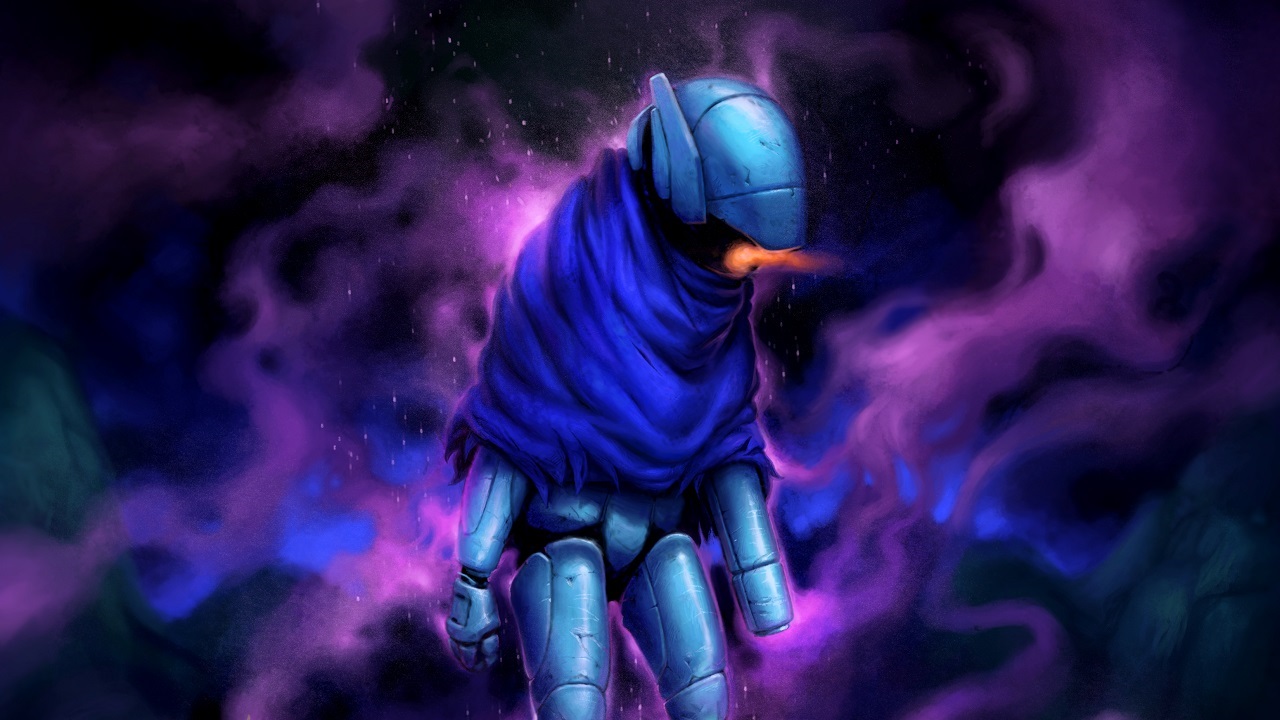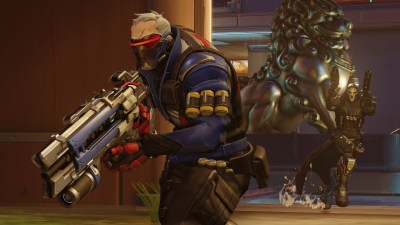After spending some time replaying Super Metroid recently, I found myself craving a new game that could fill the Metroid-shaped hole in my heart while I wait for Chasm to finally release. Enter Ghost Song, a project successfully funded via Kickstarter back in 2013.
Developed by Matt White under the name Old Moon Games, Ghost Song places you in the shoes of an unidentified protagonist and asks you to explore an alien planet. The game’s official blurb invites players to “embark on an emotional quest to find closure for those you love and for yourself,” although the current build doesn’t feature much in the way of a narrative at the moment.
There are plenty of allusions towards something eerie going on behind the scenes, however. The few NPCs that you meet are mostly dying crew or soldiers, at least one of whom warns you about an ambiguous alien menace. It remains to be seen how story-driven the final experience is, though that doesn’t mean that Ghost Song is short on atmosphere - far from it.
Ghost Song is a classic Metroidvania, tasking you with exploring 2D environments, defeating enemies and levelling up, and unlocking new abilities which allow you to access previously inaccessible areas. Other games have influenced the project - Phantasy Star Online is one - but the overall tone and atmosphere takes its cue from nothing less than Dark Souls.
That latter title has also influenced White’s approach to map design; Dark Souls’ world, the way that Lordran loops back in on itself and hides areas off the beaten path, has led to White taking the same approach in Ghost Song.
Other things stand out that may have been inspired by Ghost Song‘s disparate set of influences. The tall, lurching monsters that wander the hallways are reminiscent of Metroid Prime‘s Chozo interpreted through the lens of Dark Souls; the small, dinging robots that activate at your approach, and the small robot that you eventually gain as something of a companion, evoke memories of Phantasy Star Online.
Elements drawn from Super Metroid are more obvious, most notably in the long, monster-filled hallways, but also in the tall (also monster-filled) vertical shafts with small ledges and platforms to traverse. The jump animation, that begins as a simple leg movement but soon turns into a corkscrew animation, is pure Metroid, as are the tubular doors which block your path. And the blaster that you use to dispacth enemies could well have been stolen from Samus Aran’s personal armory, so familiar is it in both function and appearance.
If that was all that Ghost Song had to offer, it would be easy to write it off as just another Metroidvania in a landscape that’s hardly short of them at the moment. But Matt White has introduced plenty of tweaks to the formula. An early Dash upgrade allows you to pass through sharp, thorny growths unharmed, and you discover special weapons as you progress which require their own ammunition, refilled either by activating a save-point or by collecting the green, seaweed-like flowers littered throughout the world.
Ghost Song is also hard. In yet another nod to the Souls games, combat is challenging without ever feeling unfair. Before getting the Dash upgrade, a lot of time will be spent ineffectually trying to dodge enemies’ attacks without much success, until you eventually learn their patterns several undignified respawns later.
A few kinks betray the game’s unfinished status. Since the initial areas of Ghost Song’s world aren’t currently mapped out, it can be difficult to gauge where you’re going to start with; it’s easy to find yourself wandering into rooms without any direction or goal in mind, just hoping to find a flower that will replenish Saymond’s health before another poison-throwing monster or horrible flying robot whittles away what precious little life force you have left. The parts of the game that are mapped out fare better, but the map isn’t exceptionally precise at the moment, bringing its own set of problems. But White is aware of the issue, and has promised that these kinks will be ironed out by release.
Ghost Song purports to be filled with secrets, but since I am terrible at exploring maps and finding hidden areas, I honestly couldn’t tell you if it is or not. The only secret that I managed to bumble my way into was a hidden path tucked into the corner of an unlit corridor, where I found an upgrade to my cannon’s damage output.
In the current build there’s a helpful swarm of magenta-colored lights that will lead you toward objectives that are hidden within the map, but since the game’s mission statement expressly warns that Ghost Song “will not hold your hand,” on current evidence it appears that these lights will be few and far between, dispensed only for items or upgrades that are required to further progress the story.
Meanwhile, enemies who leap back and forth while spitting poison globs initally means that navigating through areas can feel more trial than traversal; but passageways are never so congested with enemies that it’s impossible to just avoid them once you’re familiar with their movement patterns, allowing you to forego the experience they yield for the sake of expediency.
Of course, it wouldn’t be a Metroidvania game without challenging boss encounters, and Ghost Song doesn’t disappoint. The first boss you encounter - some sort of zombie astronaut - gave me a lot of trouble thanks to his powerful homing attacks. After discovering that I was allowed to leave the area, I decided that I’d come back later. But the boss had other ideas: As soon as I’d collected my Dash, I returned to a previously-safe hallway to find that he’d been in pursuit the whole time.
Die - and you frequently will - and the screeching, halting noise that bursts out the speakers is likely to cause plenty of people to jump out of their seat, as though the volume has suddenly been dialed up. That could be intentional, though in the long run it’s likely to annoy more than startle. Other than that, Ghost Song‘s eerie synth soundtrack fits perfectly with the game’s atmosphere and tone, conjuring forth images of broken circuitry which, despite their death, continue to gasp out ghostly music.
Ghost Song doesn’t quite capture the exact spirit of Super Metroid - yet - but perhaps that’s a good thing. There are enough familiar mechanics for it to be called a solid Metroidvania, but Ghost Song has enough personality and ideas of its own that it avoids feeling formulaic. While a reimagining of Super Metroid certainly isn’t something that I would sneeze at, the indie scene is at its best when it brings new ideas to the table, rather than simply repurposing existing tropes.
Hopefully Old Moon Games is able to do just that, because based on current evidence there’s plenty of potential for Ghost Song to end up being something rather special.



